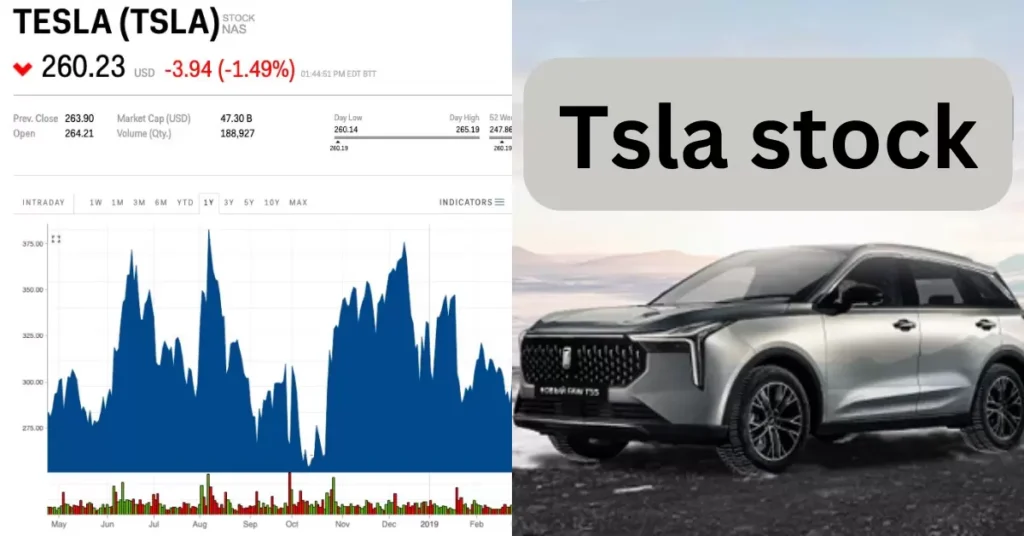Tesla stock, the pioneering electric vehicle (EV) manufacturer, has captured the imagination of investors and disrupted the traditional automotive industry. As the company continues to push boundaries with its innovative products and technology. Its stock, TSLA, has become a closely watched and highly volatile trading asset.
In this comprehensive analysis, we’ll delve into the key factors driving Tesla’s stock performance, market dynamics, and future prospects through the lens of FinTechZoom’s cutting-edge financial analysis tools.
Tesla’s stock Disruptive Impact on the Automotive Industry
Tesla stock impact on the automotive industry cannot be overstated. The company has introduced groundbreaking products such as the Model S, Model X, Model 3, and the recently unveiled Cybertruck. All of which are fully electric vehicles (EVs) with cutting-edge features and technology. By pioneering the mass-market adoption of EVs, Tesla has challenged the dominance of traditional automakers and sparked a shift towards sustainable transportation.

One of Tesla’s most significant innovations is its self-driving capabilities. The company’s Autopilot and Full Self-Driving (FSD) features have set the stage for the future of autonomous driving, pushing the boundaries of what was once considered science fiction. Also, Tesla’s energy storage solutions, such as the Powerwall and Megapack, have positioned the company as a leader in the renewable energy sector.
Tesla’s first-mover advantage and brand recognition in the EV market have been instrumental in its success. The company’s vehicles have garnered a cult-like following, with many consumers willing to pay premium prices for the Tesla brand and its associated technology.
Financial Performance and Valuation Metrics
Despite its impressive technological advancements, Tesla stock financial performance has been a subject of intense scrutiny. FinTechZoom’s financial statement analysis tools provide valuable insights into the company’s revenue growth and profitability.
| Year | Revenue ($ billion) | Net Income ($ billion) |
| 2020 | 31.5 | 0.72 |
| 2019 | 24.6 | 0.02 |
| 2018 | 21.5 | -0.98 |
| 2017 | 11.8 | -1.96 |
| 2016 | 7.0 | -0.67 |
As the table illustrates, Tesla has experienced significant revenue growth in recent years, driven by increasing demand for its electric vehicles. However, the company’s profitability has been inconsistent, with periods of net losses interspersed with modest profits.
When it comes to valuation metrics, TSLA’s price-to-earnings (P/E) ratio is currently around 60, which is relatively high compared to industry peers such as Ford (P/E of 6.2) and General Motors (P/E of 5.9). This high P/E ratio could be interpreted as either an indication of investors’ confidence in Tesla’s future growth potential or an overvaluation of the stock.
FinTechZoom’s proprietary stock rating system assigns TSLA a “Buy” rating, with a target price of $900 per share, representing a potential upside of approximately 20% from its current trading levels. However, it’s important to note that stock ratings and target prices are subject to change based on ongoing market conditions and company performance.
Market Dynamics and Competitive Landscape
While Tesla enjoys a dominant position in the EV market, the competitive landscape is rapidly evolving. Established automakers such as Volkswagen, Ford, and General Motors have announced ambitious plans to introduce their own electric vehicle lineups, posing a potential threat to Tesla’s market share.
Furthermore, emerging EV startups like Rivian, Lucid, and Fisker are vying for a piece of the electric vehicle pie, leveraging innovative technologies and fresh approaches to challenge Tesla’s dominance.

On a global scale, the demand for electric vehicles is steadily increasing, driven by factors such as:
- Government incentives and regulations aimed at promoting sustainable transportation and reducing carbon emissions.
- Rising consumer awareness of environmental issues and a desire for eco-friendly alternatives.
- Advancements in battery technology and charging infrastructure, making EVs more practical and accessible.
However, the EV industry is not without its challenges. Supply chain disruptions and the sourcing of raw materials for battery production have been recurring issues, potentially hindering the ability of manufacturers to meet the growing demand for EVs.
Elon Musk’s Leadership and Influence
No discussion of Tesla would be complete without addressing the pivotal role of its visionary CEO, Elon Musk. Musk’s unconventional leadership style and bold ambitions have been both a driving force behind Tesla’s success and a source of controversy.
On the one hand, Musk’s vision of accelerating the transition to sustainable energy has inspired legions of loyal followers and investors. His relentless pursuit of innovation and willingness to take calculated risks have propelled Tesla to the forefront of the EV revolution.
“We’re going to travel to the stars and be out there among the stars and the other planets. That’s what I want for the future of humanity.” – Elon Musk

However, Musk’s outspoken nature and frequent use of Twitter to share his thoughts and opinions have also contributed to heightened stock volatility. His tweets have been known to move markets, sometimes landing him in hot water with regulatory bodies.
Furthermore, concerns have been raised about CEO succession planning and corporate governance at Tesla. Musk’s larger-than-life persona and unorthodox management style have led some to question the company’s long-term stability and decision-making processes in the event of his departure.
Also Read: Fintechzoom Nio Stock Soars: Investment’s Next Big Thing?
Future Growth Prospects and Risks
Looking ahead, Tesla has ambitious plans for future growth and expansion. The company is actively developing new vehicle models, including the highly anticipated Cybertruck and the Semi, a fully electric semi-truck aimed at the commercial transportation sector.
Also, Tesla is aggressively pursuing global market penetration, with plans to establish manufacturing facilities in various regions, such as the recently opened Gigafactory in Berlin, Germany.
FinTechZoom’s analysis identifies several potential growth drivers for Tesla, including:
- Continued growth in consumer demand for EVs, fueled by environmental concerns and technological advancements.
- Expansion of Tesla’s energy storage solutions and integration with renewable energy sources.
- Successful commercialization of self-driving technology and potential foray into ride-sharing services.
However, Tesla’s growth ambitions are not without risks and challenges. Some of the key risks identified by FinTechZoom include:
- Production Ramp-up Challenges: Tesla has historically struggled to meet production targets and maintain quality control during rapid expansion phases.
- Supply Chain Constraints: Continued disruptions in the supply of critical components, such as semiconductors and battery materials, could hinder production and delivery timelines.
- Regulatory Hurdles: Varying regulations and policies related to electric vehicles and autonomous driving technology across different markets could pose obstacles to Tesla’s global expansion plans.
- Competition: As the EV market becomes more crowded, Tesla may face intensified competition from established automakers and well-funded startups, potentially eroding its market share.
Despite these risks, FinTechZoom’s analysis suggests that Tesla’s growth potential remains promising, driven by its technological leadership, strong brand recognition, and the global shift towards sustainable transportation.
Conclusion
Tesla journey has been nothing short of remarkable, disrupting the automotive industry and capturing the attention of investors worldwide. Through FinTechZoom’s comprehensive analysis, we’ve explored the key factors driving Tesla stock performance, including its disruptive impact, financial metrics, market dynamics, and the influential leadership of Elon Musk.
While Tesla has encountered challenges and controversies along the way, its innovative spirit and unwavering commitment to sustainable energy solutions have positioned the company as a frontrunner in the electric vehicle revolution.
FinTechZoom’s overall assessment is that TESLA stock represents a compelling investment opportunity for those willing to embrace the inherent volatility and risks associated with a company operating at the forefront of technological disruption.
Frequently Asked Questions
What is Tesla’s current market capitalization?
As of April 2024, Tesla’s market capitalization stands at approximately $650 billion, making it one of the most valuable companies globally. This market cap reflects investors’ confidence in Tesla’s ability to dominate the electric vehicle market and its potential for future growth in adjacent industries like energy storage and autonomous driving.
How does Tesla’s valuation compare to other automakers?
Tesla’s valuation is significantly higher than that of traditional automakers. For example, Ford and General Motors have market capitalizations of around $50 billion and $60 billion, respectively. This discrepancy can be attributed to Tesla’s perceived status as a technology company focused on sustainable transportation rather than a traditional automotive manufacturer.
What are the main risks associated with investing in Tesla?
Investing in Tesla carries risks such as market volatility, regulatory challenges in the automotive industry, and dependence on technological advancements, which may impact profitability and shareholder returns.
What is Tesla’s strategy for future growth?
Tesla’s strategy for future growth revolves around expanding its product line to include affordable electric vehicles, increasing production capacity, and diversifying into renewable energy solutions like solar and energy storage.
How does FinTechZoom’s analysis perceive Tesla’s growth potential?
FinTechZoom’s analysis perceives Tesla stock growth potential positively, citing its innovative technology, increasing market share in electric vehicles, and potential for disruption in adjacent industries like energy and transportation.

Haarrii, a seasoned finance expert with 4 years of hands-on experience, brings insightful analysis and expert commentary to our platform. With a keen eye for market trends and a passion for empowering readers, Haarrii delivers actionable insights for financial success.







